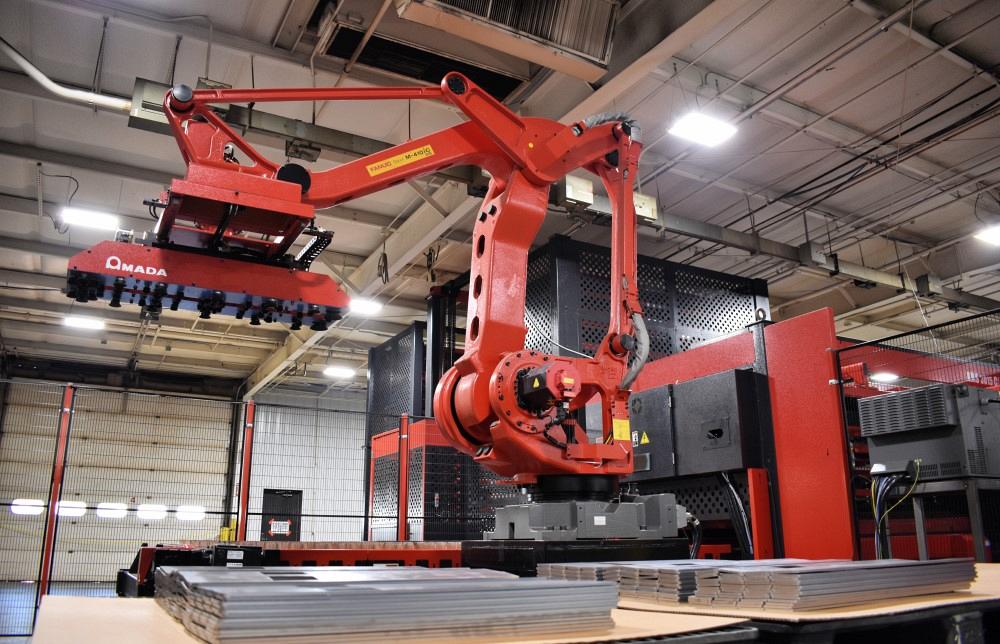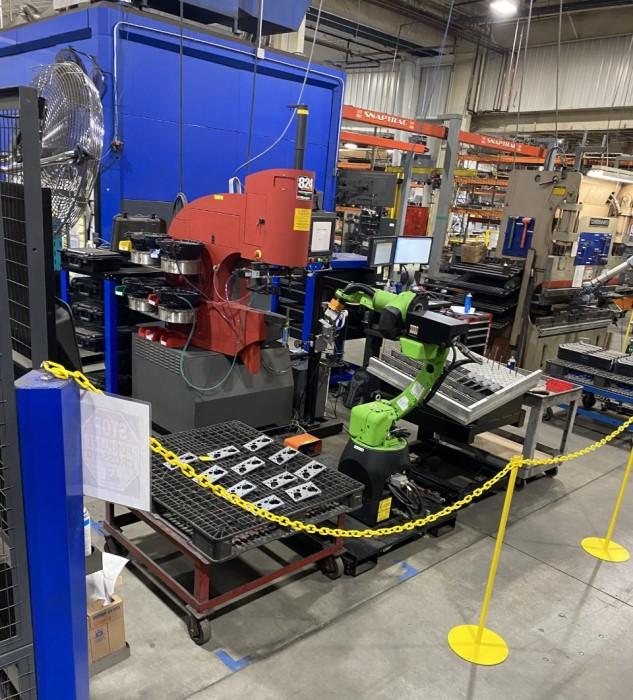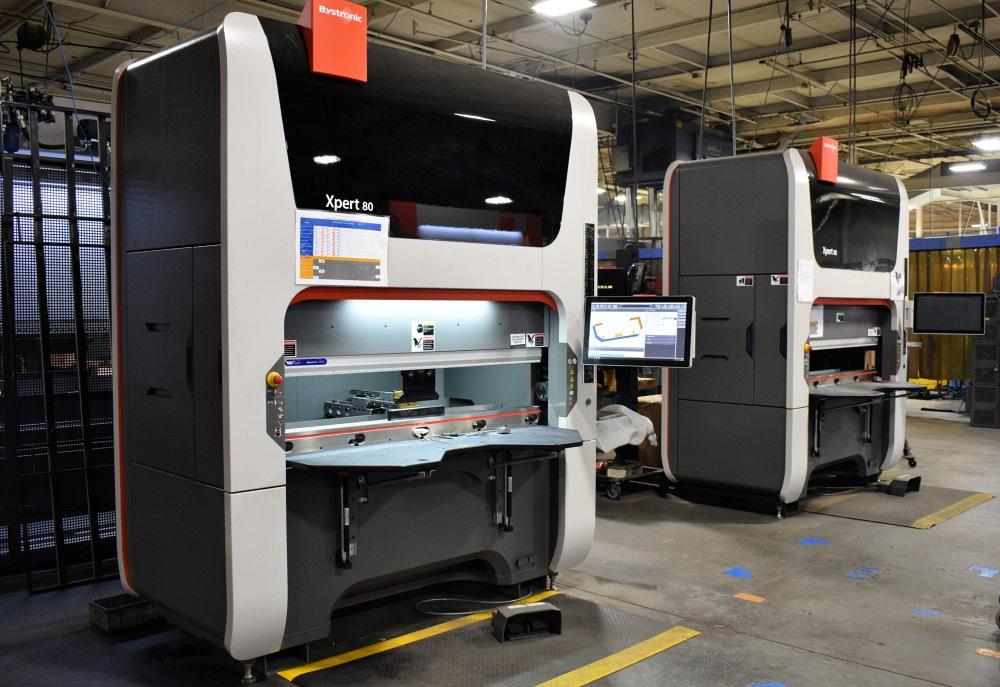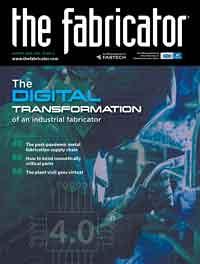Editor-in-Chief
- FMA
- The Fabricator
- FABTECH
- Canadian Metalworking
Categories
- Additive Manufacturing
- Aluminum Welding
- Arc Welding
- Assembly and Joining
- Automation and Robotics
- Bending and Forming
- Consumables
- Cutting and Weld Prep
- Electric Vehicles
- En Español
- Finishing
- Hydroforming
- Laser Cutting
- Laser Welding
- Machining
- Manufacturing Software
- Materials Handling
- Metals/Materials
- Oxyfuel Cutting
- Plasma Cutting
- Power Tools
- Punching and Other Holemaking
- Roll Forming
- Safety
- Sawing
- Shearing
- Shop Management
- Testing and Measuring
- Tube and Pipe Fabrication
- Tube and Pipe Production
- Waterjet Cutting
Industry Directory
Webcasts
Podcasts
FAB 40
Advertise
Subscribe
Account Login
Search
Change is constant at DeWys Manufacturing
Revisiting Industry Award winners: Michigan metal fabrication shop and 2014 Industry Award winner always looks to stay fresh
- By Dan Davis
- September 4, 2020
- Article
- Shop Management

DeWys Manufacturing’s latest fiber laser cutting machine from Amada America has parts sorting automation. Images provided by DeWys Manufacturing
As time passes, things don’t stay the same for DeWys Manufacturing.
In 2014 the Marne, Mich.-based job shop had just come off a year with sales revenue of $22.5 million and had demonstrated great success in reinventing its operations, eliminating work-in-process piles on the shop floor and reducing shop lead times to around three days from a week. It was on a roll, considering it had posted record sales in the years previous, including some really difficult times in 2008 to 2010. As a result, The FABRICATOR awarded the company its Industry Award that year.
Heading into this year, CEO Jon DeWys said the company had a goal of reaching $38 million in annual sales, but then 2020 happened. While the shop could not have exactly planned for a global pandemic, it had taken aggressive steps to diversify itself over the past several years. So when the commercial office furniture market, which has a large presence in west Michigan, was deemed a nonessential business sector during the Michigan shutdown for the COVID-19 outbreak, DeWys saw some of their large customers’ purchase orders come to a halt. Fortunately, that was offset by other customers ramping up production for the medical market, including temporary hospital beds, which may yet be used in some fashion before this pandemic is over.
Even with the ups and downs of this economic slowdown, DeWys Manufacturing has been able to avoid major layoffs. Some employees left in the early days of the coronavirus crisis, believing it to be the safest move for them, but the metal fabricator also has brought on new employees during the same time. DeWys Manufacturing has about 210 employees now.
“We’re at the point where we have pivoted significantly,” DeWys said. “Now we are reassessing strategies in new growth opportunities where we may have not necessarily looked before or in areas that may not have existed before the pandemic.”
In the years since 2014, the company has proven adept at keeping its head up as it keeps its nose to the grindstone. Back then DeWys said it was part of their evolution, changing from a fab shop to a “professional organization.” When reminded of that comment, DeWys said that the company continues to demonstrate professionalism in its operations, but is also looking to stay “fresh.”
It’s done just that with a commitment to exploring new strategies and endeavors, while remaining committed to what has served the company well in the past.
What’s Changed
DeWys isn’t shy about sharing his company’s experience with the One-Page Strategic Plan, a planning document that is easy to digest and quickly covers the company’s goals and plans to get there. He believes it’s one of the main reasons that DeWys Manufacturing has been able to continue to grow over the years.
This tool is meant to get everyone on the same page when it comes to the company’s future. In the one-page format, the document covers cores and values, which will help the company determine whether it should or should not do something; the company mission; near-term targets that will help determine success; tactical goals to be achieved over the following year; steps over the coming months to define how goals will be achieved; and who is responsible for actions defined in the document.
The document is revisited at the monthly company meeting, so the common vision—which is brief and clearly stated—is familiar to all. In fact, each department, from accounting to shipping, has its own one-page strategic plan that guides actions for that group of people and ties back to the company’s strategic goals and mission.

When DeWys Manufacturing sought to automate its hardware insertion process, the equipment manufacturer told them that it was working on it, but that the focus was in the European Union market at the moment. DeWys Manufacturing decided not to wait and assigned its innovation team to find an answer. The result is a collaborative robot in front of a hardware insertion machine with multiple bowls feeding different inserts.
“What I think has really helped our team is having the vision right in front of everyone,” DeWys said. “I don’t want to say that it’s from the top down because when we do this strategic planning, we get everybody involved. It’s actually more of a down-and-up planning process.”
He added that without a simple, visual document like this guiding company actions, he thinks the shop “would make a lot of steps backwards.”
To ensure accountability, members of each individual department revisit their one-page plans on a weekly basis, grading them according to a simple, color-coded system. Green means the goal was achieved, and yellow indicates the team almost got there. Red means the team fell short.
“It’s been a significant tool to help our business. We share it with all 210 people,” DeWys said. “Everyone knows where we want to be. For example, one of our long-term goals is that we want to be a multisite company capable of supporting $100 million. We don’t know right now necessarily how we’re going to get there, but at least everyone sees the target.”
As the simplified approach to strategic planning has helped to support its growth in recent years, DeWys Manufacturing also has expanded its facility to accommodate the actual increase in business. It was supposed to complete a 35,000-sq.-ft. expansion this spring, but the pandemic put the brakes on the final steps that would have completed construction. Once it’s done, the Marne facility will be 125,000 sq. ft.
The expansion does two things for DeWys Manufacturing. It will enable them to consolidate two smaller nearby facilities, one where a 10-person team built dedicated products for a customer and a small warehouse. The newly expanded space also will be home to the company’s new Stainless Solutions business unit.
DeWys Manufacturing has been a longtime believer in the use of value streams to organize plant flow. For those new to the concept in the world of high-mix/low-volume manufacturing, value streams group similar product types according to the fabricating equipment needed to produce those parts. The idea is that this type of flow reduces tooling changeovers and keeps the flow of material constant, with fewer stops mandated by extreme differences in material type or thickness.
DeWys said that the company currently has eight value steams on the shop floor. A laser cutting area feeds the eight streams, which all have their own press brakes and welding cells, and the streams then come together either heading to the powder coating line or moving straight to the final assembly area.
“A flat part is a flat part,” DeWys said. “Once you start adding value-added features to the product, it takes on a whole new function, especially when many other nonmetal components are added in the assembly process.”
The Stainless Solutions business unit is actually its own value stream. It is an outgrowth of the company’s customers in the industrial, food service, and chemical processing sectors. Stainless steel is often specified for parts because it displays a great combination of durability and corrosion resistance. However, if the material is contaminated during production, which may not be visible to the human eye, the stainless steel can become susceptible to corrosion down the road. That can prove very costly to a company that has to go in and replace stainless steel end products or processing equipment because of corrosion that was not supposed to occur.

These two Bystronic 80-ton press brakes are the latest additions to the company’s roster of bending equipment.
In many instances, those particular companies want their metal fabricating service suppliers to have dedicated equipment for stainless steel or even require shops to produce those parts in a space that is separated from mild steel fabricating activities. With the expansion, DeWys has chosen to do the latter. (The business unit also is involved in other nonferrous work, such as aluminum, which aligns with those same end market customers.)
Unlike the other value streams, Stainless Solutions is supported by its own laser cutting machine. Only nonferrous parts come out of the skeletons from this equipment.
“We have half a dozen team members just supporting this business,” DeWys said. “They’re specifically trained to handle the material and run the equipment.”
Investing in new capital equipment has always been a part of the business plan at DeWys Manufacturing. DeWys said the company tries to follow the rule of thumb that it invests in new technology what it depreciated the year before.
In 2020 that meant two Bystronic 80-ton press brakes were installed right before the pandemic struck, bringing its total number of brakes to 10. (The metal fabricator decided to standardize on Bystronic press brakes in the early 2010s.) The shop also is scheduled to install an 9-kW fiber laser cutting machine from Amada America later this year. DeWys said the equipment, which comes with automated parts picking technology, will be one of the first of its kind in the U.S.
“We’re actually going to set it up so that it feeds a press brake. That’s a really cool thing,” he said.
The company also has brought collaborative robots to its shop floor, two working in front of press brakes and two operating hardware insertion presses. The latter is something that the company’s innovation team developed on its own after the equipment manufacturer wasn’t ready to roll out the technology from Europe, where it was being proven out.
“Now we have a brand-new Haeger press that a collaborative robot is running. The collaborative robot, called Lucy, selects the next flat blank from a stack of parts and mimics a human’s movement as the insertion machine selects the next fastener. It’s a remarkable process to watch,” DeWys said.
The company’s innovation team, made up of six people who are dedicated to improving shop floor processes, investigating automation opportunities, and training staff in lean manufacturing principles, is even taking a look at the use of automated guided vehicles, technology typically seen at large OEMs like vehicle assembly plants. DeWys said the application would be very specific—moving product from the end of the powder coating line to the warehouse—but it’s an example of how dedicated the company is to minimizing non-valued-added activities, such as material handling.
What Didn’t Change
The 2014 story on DeWys Manufacturing mentioned how a large office furniture manufacturer invited the job shop to send two of its employees to a six-month program to learn about the Toyota Production System. Even as DeWys Manufacturing was rolling out its own version of a continuous improvement program, the company decided to participate. It would be a good experience and good for customer relations.
Well, the metal fabricator continues to practice lean manufacturing techniques, always looking to eliminate wastes and find better ways to accomplish tasks. The innovation team makes sure of that. It’s part of their push for operational excellence, or “OPEX” as it’s referred to around the company. It’s actually in the center of what every department does.
Every morning each department has a meeting around its own OPEX board. That storyboard gives the employees an idea of what’s happening and what’s important in their department. It details the results of metrics being used to track fabricating processes. It covers problems that have been discovered and details the steps taken to resolve them. Safety is always addressed on the board, and it leads off every meeting that takes place each morning.
The interesting part of this effort is that it has now migrated to the front office. They are being held to the same quality improvement standards as the shop floor. It makes sense because they can easily affect customer satisfaction with a simple mistake like writing down a wrong delivery date.
So they have daily meetings where they share information, even safety tidbits, and talk about what happened yesterday, what’s expected today, and what might be ahead. “At least, we’re all working on the same stuff together rather than people doing their own things on islands,” DeWys said.
Again looking back at 2014, DeWys Manufacturing had just launched its DeWys University initiative, a movement to solidify and build the skills of its employees. At the time of the original feature, it had launched its first welding classes. Today DeWys described it as “part of our fabric now.”
“What makes our training process unique compared to many other companies is the use of designated trainers. Their No. 1 job is to train,” he said. “People always come up to me and ask, ‘How can you afford to dedicate a well-compensated person to not be running parts, but instead training other people?’ I respond by saying what is the cost of turnover. Do you have an untrained team member making bad parts? How long does it take an inexperienced person to get up to speed on the shop floor? We have reduced learning curves from years to months with our dedicated trainers and curriculum. That’s immediate ROI to DeWys University.
“I’d rather spend money on things that I know I can control rather than risk a bad hire or suffer from poor quality.”
All training is curriculum-based and covers pretty much all of the activities in the shop: running a laser cutting machine, operating a press brake, welding, deburring, inserting hardware, powder coating, and machining. The institute within a manufacturing company also offers courses for soft skill development, such as sales training.
The schooling had slowed a bit with the pandemic, but DeWys said it was ramping up as of July. The goal was to sharpen employees’ skills as the company waited for its customers to get back in the swing of things and start placing larger and more frequent job orders.
Overseeing all of this activity is the new company president, Mark Schoenborn. He has been with DeWys Manufacturing for 25 years, starting out as a maintenance technician and working his way through several positions, including scheduler, purchasing agent, materials manager, chief operating officer, and vice president. He started in his president’s role at the beginning of 2020, so his early tenure has been very challenging. But DeWys said that the pandemic has actually helped him get to know Schoenborn’s management style as they have been forced to work very closely in addressing some tough decisions related to cost containment and trying to figure out what may be ahead.
The uncertainty that is plaguing most metal fabricators is having the same effect on DeWys Manufacturing. A good company culture, skilled employees, a solid training program, and the latest fabricating technology put a shop in a good position to succeed, but it’s still unnerving not knowing when normalcy might return. Past success gives DeWys confidence about the future, but new blood that has entered the organization over the past six years excites him about what they can accomplish.
“We love the new energy that is coming out of the high schools and the colleges,” DeWys said. “It’s nice to infuse the new ideas and thoughts into our traditional culture.
“I would say we’re still a professional organization, but we’re trying to stay fresh, whether it’s technology, processes, or even our strategic planning. We want to be relevant, and I think we’re doing a good job of being that."
About the Author

Dan Davis
2135 Point Blvd.
Elgin, IL 60123
815-227-8281
Dan Davis is editor-in-chief of The Fabricator, the industry's most widely circulated metal fabricating magazine, and its sister publications, The Tube & Pipe Journal and The Welder. He has been with the publications since April 2002.
Related Companies
subscribe now

The Fabricator is North America's leading magazine for the metal forming and fabricating industry. The magazine delivers the news, technical articles, and case histories that enable fabricators to do their jobs more efficiently. The Fabricator has served the industry since 1970.
start your free subscription- Stay connected from anywhere

Easily access valuable industry resources now with full access to the digital edition of The Fabricator.

Easily access valuable industry resources now with full access to the digital edition of The Welder.

Easily access valuable industry resources now with full access to the digital edition of The Tube and Pipe Journal.
- Podcasting
- Podcast:
- The Fabricator Podcast
- Published:
- 04/16/2024
- Running Time:
- 63:29
In this episode of The Fabricator Podcast, Caleb Chamberlain, co-founder and CEO of OSH Cut, discusses his company’s...
- Industry Events
16th Annual Safety Conference
- April 30 - May 1, 2024
- Elgin,
Pipe and Tube Conference
- May 21 - 22, 2024
- Omaha, NE
World-Class Roll Forming Workshop
- June 5 - 6, 2024
- Louisville, KY
Advanced Laser Application Workshop
- June 25 - 27, 2024
- Novi, MI































